- Overview
- Description
- Specifications
- Experiment & Sample preparation
- Data Analysis
- Publications
- Staff
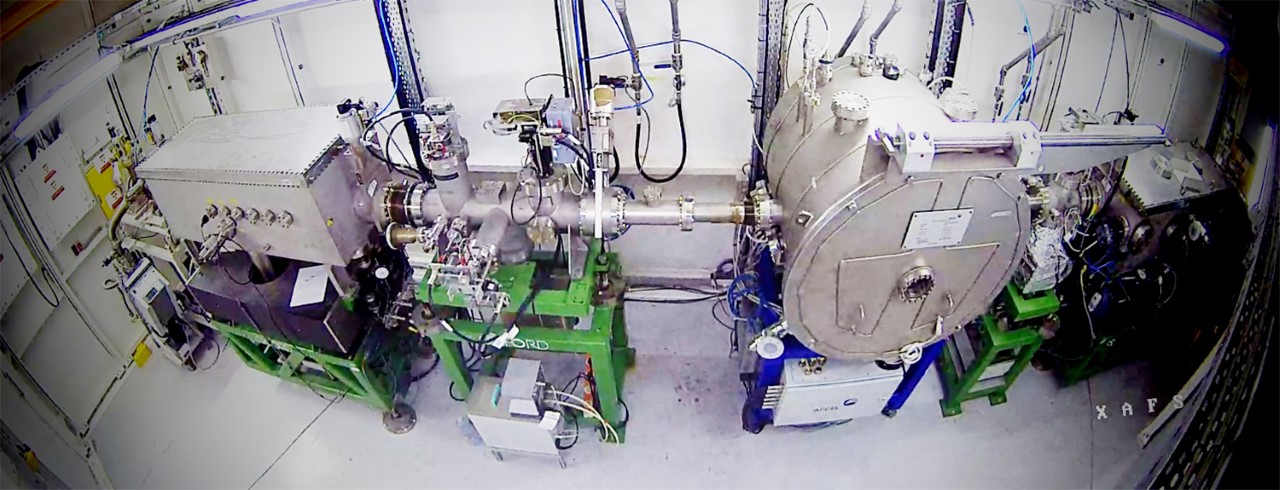
Welcome to the XAFS/XRF beamline at SESAME.
XAFS/XRF is a beamline dedicated to X-ray Absorption Spectroscopy. It is built on the bending magnet at the eighth cell of the SESAME storage ring (BM08) and allows access to a wide energy range: from 4.7 to 30 keV, with high photon flux (109-1012 ph/s) and high beam stability. This meets the needs of a large number of researchers.
The XAFS/XRF beamline is designed for X-ray spectroscopic studies in all fields of science.
The monochromatic X-ray beam of XAFS/XRF, combined with the highly-sensitive 64 element silicon drift detector, and the ionization chambers and motorized stages for sample and detector movements offers the synergistic application of X-Ray Absorption and Fluorescence Spectroscopy for multidisciplinary applications.
This instrument, which has been hosting users since July 2018, may be used in numerous fields of research among which: environmental science, energy storage, cultural heritage, and catalysis, as well as solid state physics and bio-chemistry.
Beamline Optical Layout
The XAFS/XRF beamline is located at the bending-magnet port BM08 of the SESAME storage ring. The beamline optics uses horizontally a fan of 3.0 mrad of synchrotron radiation of the SESAME bending magnet (1.45 T magnetic field with a critical energy 6.05 keV).
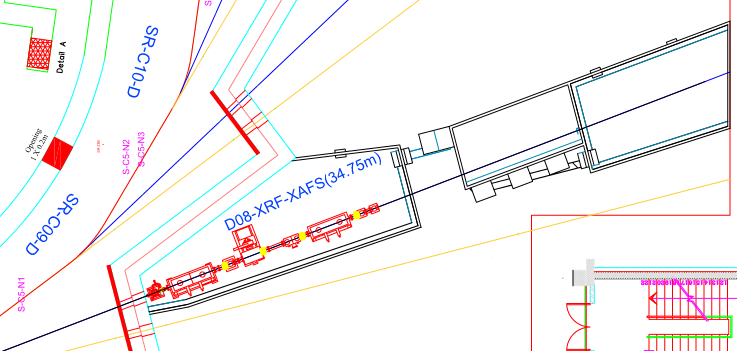
Front End
The first beamline element, after the photon shatter, is a water-cooled fixed mask, which defines the acceptance of the beam line (3.0 mrad horizontally and 0.6 mrad vertically) and reduces the heat load on the optical components by cutting off the off-axis radiation. This mask is followed by a pair of water-cooled white beam slits to define the primary beam size and a water-cooled copper rod equipped with three filters of different thickness for heat management. The beamline vacuum is separated from the ring vacuum by a CVD window (250 µm thickness). To further protect the storage ring vacuum from ruptures of the beam line vacuum a fast closing shutter is installed in the front-end section. Its sensor is placed just before the CVD window in the optical hutch.
Beamline Optics
The main elements are a fixed-exit double-crystal monochromator (DCM) located between a collimating and focusing cylindrically bent mirrors installed before and after the monochromator, respectively; each of the mirrors is double coated Si and Pt. The primary water-cooled slits are located at 12.8 m from the source after the fixed, they define the horizontal and vertical dimensions of the polychromatic beam impinging the collimating mirror (VCM, first mirror). diagnostic tools are installed after each major component such as beam position wire monitors located after the VCM and DCM and an x-ray sensitive screen that can be inserted just after the vertically focusing mirror (VFM, second mirror). Both mirrors are tilted to grazing angles (~ 2.8 mrad) in order to optimize simultaneously the angular acceptance of the incoming beam and the mirror reflectivity. Finally, a monochromatic shutter is installed at the end of the hutch for allowing the experimenter to access experimental hutches while keeping a constant heat load on the optics.
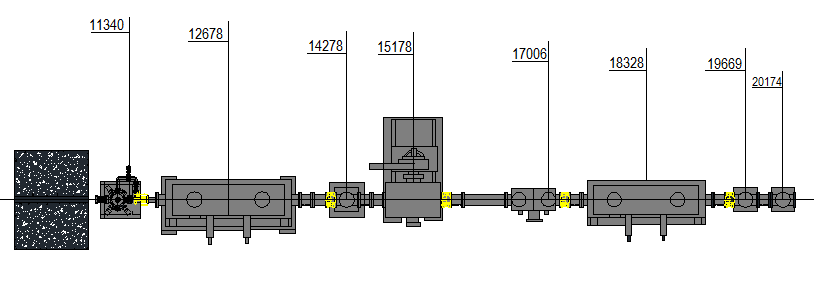
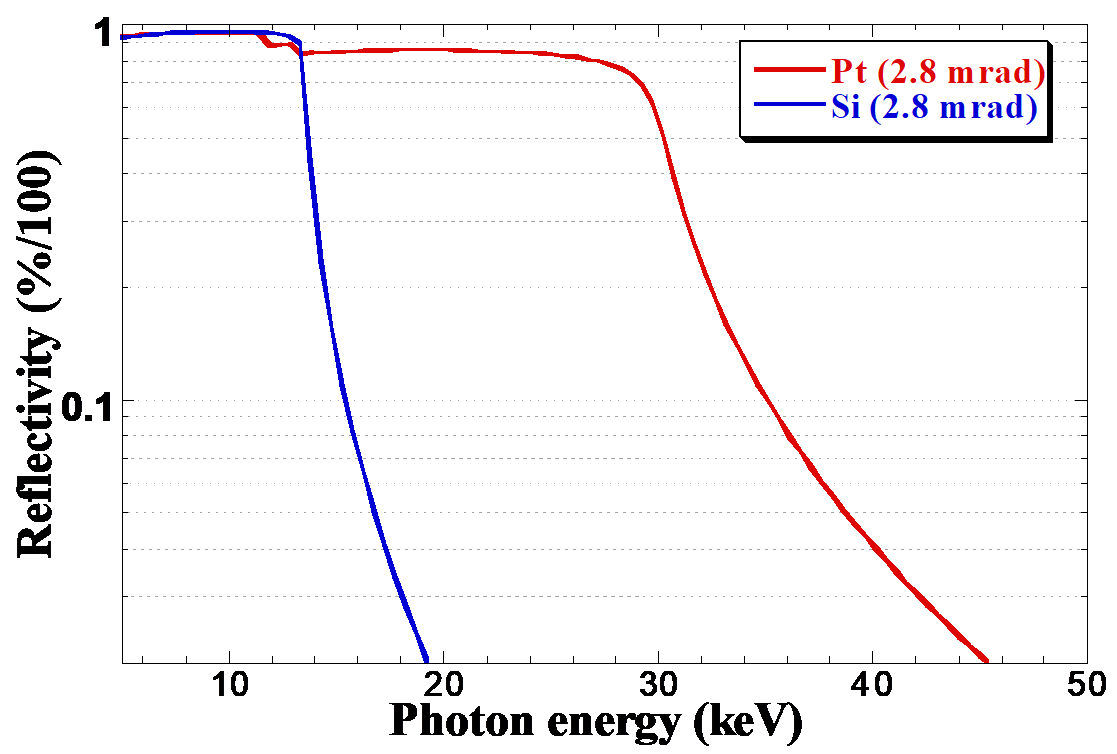
for the Si coating so that the Pt L edges artifacts in the beam are covered
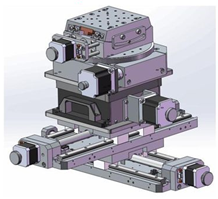
Sample manipulator
Experimental Station (End Station)
An optical table with 6-axis of freedom is used as support for different detectors (ICs, XRF detectors) as well as the support for some sample manipulator and other sample environment devises.
The standard sample manipulator consists of several modules including a horizontal and vertical translation stages as well as rotational stages covering 360° in addition to swivelling stage. The manipulator can take up to 10kg load and allow the installation and alignment of most in-situ experimental setups.
Detectors and experimental setup:
XAFS data can be collected in both transmission and fluorescence mode:
- Transmission mode:
3 ionization chambers are used. Two ICs (15 cm) are used downstream and upstream the sample for recording I0 and It and a third one (30 cm) used for recording the reference. - Fluorescence mode:
Two detectors are available for use in fluorescence mode:
Multi-element SDD state-of-the-art and unique fluorescence detector developed by INFN for samples with extreme low content (down to few ppm)- 64 elements
- High count rate (~15 M cts/s)
- Higher efficiency (low deadtime)
- 1 element D-XAS Ketek
- “DXP-Mercury” electronics from XIA
- ICR (~1 Mcts/s)
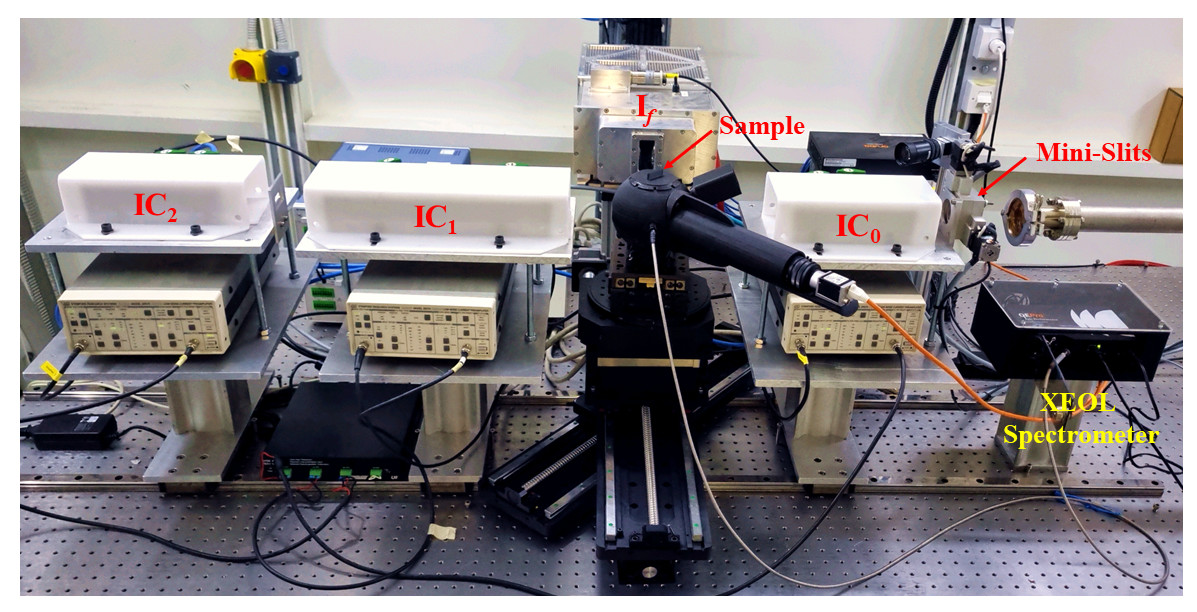
X-ray Excited Optical Luminescence (XEOL)
XEOL is available at the end station of BM-08 XAFS/XRF beamline with emission spectra measurement capability under irradiation with X-ray beam. Combined with XAFS and XRF, the new technique enables users to probe optical channels in materials, and directly correlate them with the chemical composition, oxidation state/symmetry site, coordination geometry, and local atomic structure order of the photoabsorbers. The set-up can also accommodate a LASER source, provided by the users, allowing to measure emission spectra under simultaneous LASER excitation. This experimental setup was financially supported by International Atomic Energy Agency (IAEA).
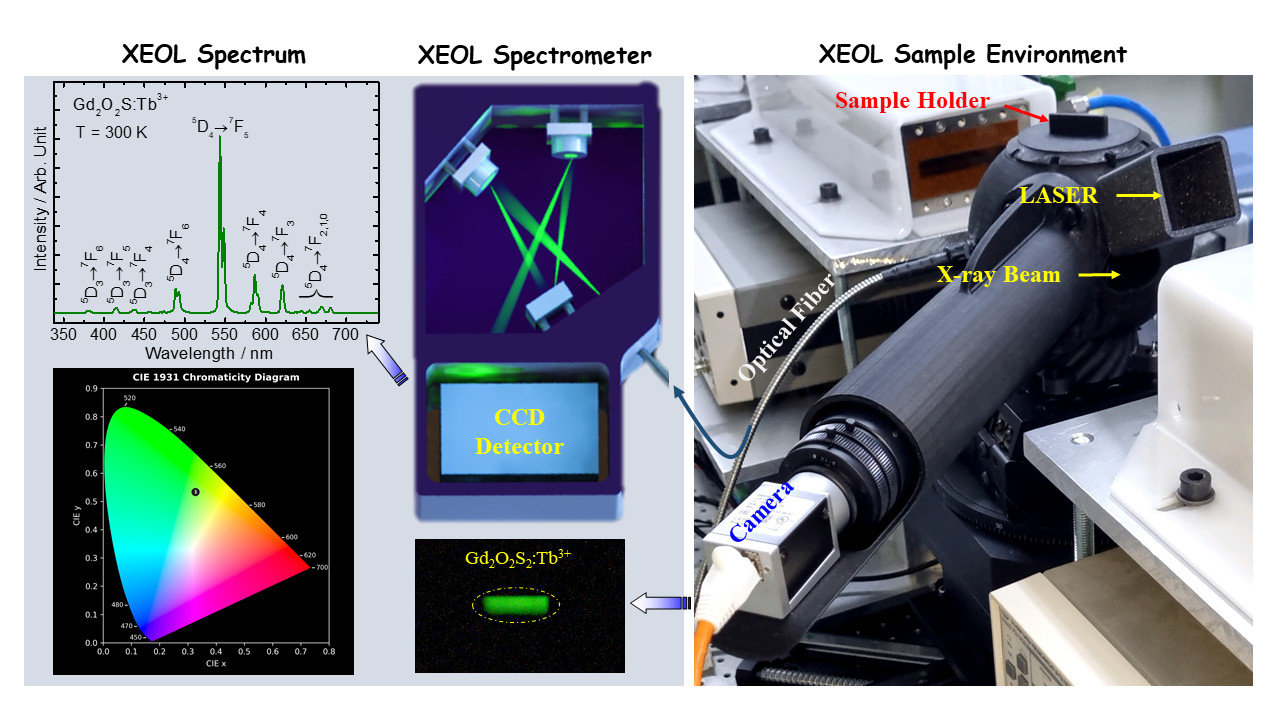
Sample Environment
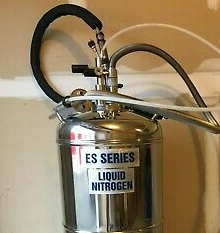
- LN2 Cryojet to cool down the sample to a temperature of about 95 K.
- Users can bring their own equipment for in-situ experiment (Cell, furnace, etc.) can be adapted to the beamline experimental station.
- Please note that the spatial resolution of the bam on sample doesn´t allow any experiment with small beam such as high-pressure using diamond cells or elemental XRF mapping.
- All forms of samples are accepted whether solid (bulk or powder), liquid and/or gas. If holders do not exist yet at the beamline, they can be fabricated at the SESAME workshop.
Users are reminded that they should contact the XRF/XAFS beamline scientists when drafting their proposal to discuss the sample environments and beamline characteristcs.
Bending Magnet (D08)
DCM - Si(111)
DCM - Si(311)
VCM
Dimensions (mm):-----------------1200 x 70
Active area (mm): :----------------1000 x 70
Coatings : -----------------------------Double coating Si and Pt
Angle of incidence (mrad) : ------2.8 (can vary)
Substrate: ---------------------------Silicon single crystal
Cooling:------------------------------- Water cooled
Flatness: ---------------------------- Cylindrical
Type of bender: --------------------Pneumatic
Minimum radius (km): ------------5.3
VFM
Dimensions (mm):-----------------1200 x 70
Active area (mm): :----------------1000 x 70
Coatings : ----------------------------Double coating Si and Pt
Angle of incidence (mrad) : ------ Variable
Substrate: ---------------------------ZERODUR
Cooling:------------------------------ Uncooled
Flatness: ---------------------------- Cylindrical
Type of bender: --------------------Pneumatic
Minimum radius (km): ------------5.3
End Station
Sample
Techniques usage
INFN (Multi SDD)
Operating temperature range: ------------- +24 to -45 °C
Signal output: -----------------------------------Low noise preamplifier
sensitive area ----------------------------------- 9 mm2 per SDD
Total collimated sensitive area: ------------499 mm2
Resolution (FWHM) @5.9keV: ---------------- Sampling rate: ----------------------------------- up to 15 Mcps
Detection
Ketek (Singl El. SDD)
Signal output: -----------------------------------Low noise preamplifier
Peaking time range: ----------------------------0.1 to 24 μs in 24 steps
Active Area: ---------------------------------------20 mm2
Resolution (FWHM) @5.9keV ----------------- 125 eV (100 Kcps with 2 μs picking time)
Detection
XEOL Spectrometer
Detection
- Sample Type: Crystal, Amorphous, Powder, Gel and Liquid.
- A modest set of tools for sample preparation can be used to prepare samples such as spatulas, balance, mortars, hydraulic press for pallets (12 mm dies), binders, etc.
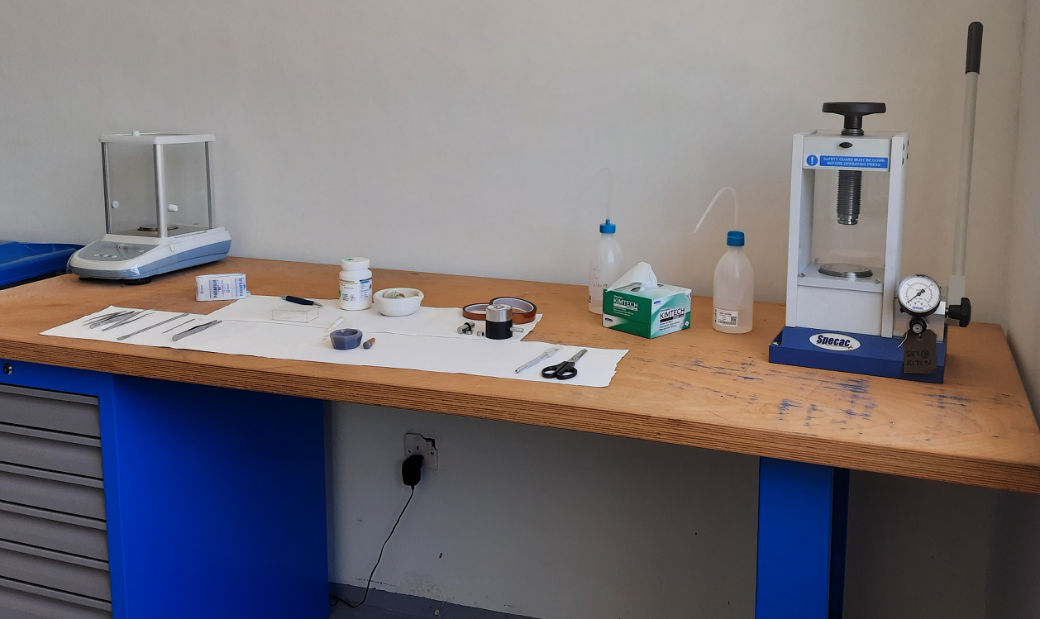
Fig. - Different tools for sample preparation
- Users are offered the help to calculate the thickness of the samples and to prepare pallets.
- Data are collected using a home developed (Python based) software.
- XAFS (XANES & EXAFS) data are saved in an ASCII format.
- XRF data are saved in JSON, CSV or HDF5 formats.
Many software can be used for Software for XAFS and XRF data analyses. Available on beamline platform are:
- Demeter (Free Software).
- WinXAS .
- FEFF6, FEFF7 (Free Software).
- PyMca (Free Software).
2026 (2), 2025 (18), 2024 (18), 2023 (11), 2022 (10), 2021 (11), 2020 (6), 2019 (4), All (80), Thesis (1)
2026
- Cost-effective sodium-ion batteries using a Na0.67Mn0.9Ni0.1O2 cathode and lavender-flower-waste-derived hard carbon with a comparative presodiation approach,
Journal: Journal of Power Sources,
Vol. 668, pp. 239365 (2026)
E Dogan, I Moeez, R Whba, S Ozcan, M Akkoc, E Altin, M Harfouche, A Aktas, F Bulut, M Arshad, I Ozdemir, S Patat, KY Chung, S Sahinbay, S Altin
doi: 10.1016/j.jpowsour.2026.239365 - Influence of iron doping on -NaMnO2 lattice symmetry: Insight from operando X-ray absorption, ex-situ structural analysis, and electrochemical performance using chestnut shell-derived hard carbon,
Journal: Journal of Power Sources,
Vol. 661, pp. 238602 (2026)
E. Dogan, A. Maiga, R. Whba, M. Harfouche, Z.R. Ozturk, A. Farhan, E. Altin, Ã. Duygulu, S. Ipek, R. Kartal, M. Karta, T. Depçi, M.N. Ates, S. Sahinbay, S. Altin
doi: 10.1016/j.jpowsour.2025.238602
- Synchrotron Radiation X-ray Excited Optical Luminescence Probing of Green Emission from Gd2O2S:Tb/PVP Scintillator,
Journal: 2nd International Conference on Spectroscopy in Materials Science ICOSIMS, Springer Proceedings in Physics,
Vol. 422, pp. 28-34 (2025)
R.I. AlZubi, Z.U. Khan, A. Aldrabee, L.U. Khan
doi: 10.1007/978-981-96-4035-5_3 - Ln3+-ion-mediated enhancement in UV/X-ray-induced optical emission from Mn2+-doped ZnSe nanocrystals,
Journal: Nanoscale,
Vol. 17 - 25, pp. 15393-15401 (2025)
I Gul, ZU Khan, MA Khan, GA Cabrera-Pasca, RI AlZubi, SJA Figueroa, HF Brito, LU Khan
doi: 10.1039/D5NR01263E - Lattice Distortion Suppressed in MoO3 by Incorporating Minor Impurities of rGO: Strategy for Enhanced Electrocatalytic Hydrogen Evolution,
Journal: ACS Appl. Energy Mater.,
Vol. 8 - 7, pp. 4456-4465 (2025)
A A. V., Z Li, CR Babu, AV Soldatov, A Hossain, EI Anila
doi: 10.1021/acsaem.5c00016 - Defect Engineering in ZnO Nanorods via Phosphorous Ion Implantation and Post-Annealing Recovery,
Journal: Journal of Alloys and Compounds, pp. 184075 (2025)
M. Usman, S. Sajid, L.U. Khan, N. Shahzad, S.S. Ali, A.H. Javed, A. Siddiqui, M.I. Shahzad
doi: 10.1016/j.jallcom.2025.184075 - Smart ZnFe2O4/Polythiophene Hybrid Interface for Rapid Esomeprazole Sensing,
Journal: Journal of Inorganic and Organometallic Polymers and Materials (2025)
S.A. Solangi, F.K. Algethami, J.A. Baig, I.B. Solangi, H.I. Afridi, F.M. Abdel-Haleem, L.U. Khan, S. Hussain
doi: 10.1007/s10904-025-04093-9 - Development and Analysis of Glycine-Modified Silica Gel for Efficient Fe3+ Ion Capture: Exploring Synchrotron XAFS Insights,
Journal: Biointerface Research in Applied Chemistry,
Vol. 15 - 5, pp. 1-18 (2025)
M.A. Al-Anber, M. Harfouche, A.K. Hijazi, D. Sobola, M. Al-Bayed, N. Al-Adaileh, S. Sagadevan
doi: 10.33263/BRIAC155.061 - Thickness-Dependent Structural and Electronic Properties of HfO2 Thin Films Probed by XRD and XAFS,
Journal: Journal of Electronic Materials (2025)
OM Ozkendir, E Cengiz, I Kanmaz, S Gunaydin, G Apaydin, M Harfouche
doi: 10.1007/s11664-025-12205-x - Advanced probing of Eu2+/Eu3+ photoemitter sites in BaAl2O4:Eu scintillators by synchrotron radiation X-ray excited optical luminescence probe,
Journal: Optical Materials,
Vol. 162, pp. 116937 (2025)
L.U. Khan, R.I. AlZubi, H.K. Juwhari, Y.A. Mousa, Z.U. Khan, S.J.A. Figueroa, P. Hans
doi: 10.1016/j.optmat.2025.116937 - A scalable, tunable, electrochemical dissolution method for anchoring single-atom catalysts on 2d sheets of molybdenum disulfide,
Journal: Materials Science and Engineering: R: Reports,
Vol. 165, pp. 101009 (2025)
SS Shetty, A Bukhamsin, MS Martinez, M Harfouche, S Singh, M Ghadiyali, MN Hedhili, S Yuvaraja, U Schwingenschlögl, KN Salama
doi: 10.1016/j.mser.2025.101009 - Non-destructive examination of ancient vitreous materials from Southwest Asia: Synchrotron computed tomography at the BEATS beamline of SESAME,
Journal: Journal of Cultural Heritage,
Vol. 72, pp. 160-168 (2025)
G. Iori, P. Hans, N.M.E. Stucchi, L.U. Khan, A. Saadaldin, E. Possenti, G. Franceschin, S. Khasawnh, G.L. Bonora, G. Dardeniz Arikan
doi: 10.1016/j.culher.2025.01.011 - The occurrence and sources of Ni in ambient air particulates using synchrotron radiation based X-ray fluorescence and X-ray absorption near edge structure,
Journal: J. Anal. At. Spectrom. (2025)
A.A. Shaltout, M. Harfouche, O.H. Abd-Elkader, D. Eichert
doi: 10.1039/D5JA00043B - Phase transition and size-tunable synthesis of Tb3+/Ce3+ co-doped hexagonal GdF3 nanoparticles: Structural characterization, optical, scintillation and magnetic properties,
Journal: Journal of Alloys and Compounds,
Vol. 1032, pp. 181102 (2025)
C.Y. Cardenas Rodriguez, O. Polozhentsev, M. Alamoush, N. Shukla, E.A. Mukhanova, A.V. Soldatov
doi: 10.1016/j.jallcom.2025.181102 - Synthesis of cobalt-doped nickel ferrite as a reusable photocatalyst for efficient degradation of industrial dyes,
Journal: Materials Research Bulletin, pp. 113830 (2025)
K. Akhtar, F.K. Algethami, J.A. Baig, I.B. Solangi, H.I. Afridi, L.U. Khan, Y.G. Abou El-Reash, S. Hussain
doi: 10.1016/j.materresbull.2025.113830 - Robust Ru single-atom alloy catalysts coupled with adjacent Fe-site for highly stable ammonia synthesis under mild conditions,
Journal: Applied Surface Science,
Vol. 685, pp. 161906 (2025)
S. Singh, E.P. Komarala, S. Kim, C.T. Yavuz, L.M. Maghrabi, N. Singh, M. Harfouche, V. Sabastian, O. Malina, A. Bakandritsos, D.H. Anjum, A.A. AlHammadi, K. Polychronopoulou
doi: 10.1016/j.apsusc.2024.161906 - Gd3+ and Sm3+ Ions Modulated Visible-Light-Emitting ZnSe:Mn2+ Nanocrystals for Detection of Pb2+ and Hg2+,
Journal: ACS Appl. Opt. Mater.,
Vol. xxx, pp. xxxx-xxxx (2025)
I. Gul, Z.U. Khan, S. Galani, S. Huda, L.U. Khan, H.K. Juwhari, A. Hyder, H.F. Brito, M. Zaheer, M.A. Khan
doi: 10.1021/acsaom.5c00240 - Copper-Induced Phase Transitions in NaMn1-xCuxO2: Structural Insights from Operando XAS, DFT Calculations, and Electrochemical Evaluation Using Laurus Nobilis-Derived Hard Carbon,
Journal: Advanced Sustainable Systems,
Vol. n/a - n/a, pp. e00678 (2025)
R Whba, E Dogan, M Harfouche, ZR Ozturk, A Farhan, S Ipek, S Corut, R Kartal, M Karta, T Depci, S Sahinbay, S Altin
doi: 10.1002/adsu.202500678 - Bismuth Ferrite Polyaniline Nanohybrid Based Electrochemical Detection of Theophylline,
Journal: Materials Research Bulletin, pp. 113386 (2025)
S.A. Solangi, J.A. Baig, I.B. Solangi, H.I. Afridi, S. Hussain, K. Akhtar, L.U. Khan, F. Abbasi, A. Hyder
doi: 10.1016/j.materresbull.2025.113386 - Synthesis of Bimetallic (Iron-Cobalt) Single Atom Catalysts for Electrochemical Detection of Nitrites,
Journal: Advanced Materials Technologies,
Vol. n/a - n/a, pp. 2401484 (2025)
G Tostado-Blazquez, M Harfouche, JL Cerrillo, A Bukhamsin, V Mani, KN Salama
doi: 10.1002/admt.202401484
- Manipulation of Energy Migration in Upconversion Nanoparticles for Long-Lived Mn2+ Emission and Enhanced Singlet Molecular Oxygen Generation,
Journal: ACS Appl. Nano Mater.,
Vol. xx - xx, pp. xxxx (2024)
Z.U. Khan, L.U. Khan, F.M. Prado, I. Gul, T. Lopes, L.M.A. Ribeiro, M. Bertotti, M. Gidlund, H.F. Brito, P. Di Mascio
doi: 10.1021/acsanm.4c04307 - Local atomic structural behavior in amorphous and crystalline diphosphate glasses co-doped by different transition metal ions (Ni2+, Cu2+ and Co2+): XAFS and XRD analysis,
Journal: Materials Letters,
Vol. 362, pp. 136235 (2024)
Y Islem Bourezg, M Kharroubi, M Harfouche, F Sahnoune, A Djemli, D Bradai
doi: 10.1016/j.matlet.2024.136235 - Long-life (Co, Al, Mg)-doped LiMn1.5Ni0.5O4 cathodes prepared by co-precipitation method,
Journal: Journal of Solid State Electrochemistry (2024)
M. Kunduraci, H. Boyaci, U. Çağlayan, D. Çirmi, O.M. Ozkendir, M. Harfouche, B. Gözmen
doi: 10.1007/s10008-024-05912-8 - Spinel cobalt-based binary metal oxides as emerging materials for energy harvesting devices: synthesis, characterization and synchrotron radiation-enabled investigation,
Journal: RSC Adv.,
Vol. 14 - 29, pp. 21180-21189 (2024)
A. Alshanableh, Y.S. Ocak, B. Aljawrneh, B.A. Albiss, K. Shawakfehc, L.U. Khane, M. Harfouchee, S. Alrousan
doi: 10.1039/D4RA03462G - Unveiling the outstanding full-cell performance of P2-type Na0.67(Mn0.44Ni0.06Fe0.43Ti0.07)O2 cathode active material for Na-ion batteries,
Journal: Journal of Power Sources,
Vol. 591, pp. 233775 (2024)
B Kalyoncuoglu, M Ozgul, S Altundag, M Harfouche, E Oz, S Avci, X Ji, S Altin, MN Ates
doi: 10.1016/j.jpowsour.2023.233775 - Tracking coordination environment and optoelectronic structure of Eu3+ and Sm3+ sites via X-ray absorption spectroscopy and X-ray excited optical luminescence,
Journal: Materials Today: Proceedings,
Vol. 00, pp. 0000-0000 (2024)
L.U. Khan, Z.U. Khan, R.I. AlZubi, M.A. Umer, H.K. Juwhari, M. Harfouche, H.F. Brito
doi: 10.1016/j.matpr.2024.03.028 - Tune and turn the pyrolysis of metal organic frameworks towards stable supported nickel catalysts for the dry reforming of methane,
Journal: Applied Surface Science,
Vol. 666, pp. 160388 (2024)
E.P. Komarala, A.A. Dabbawala, M. Harfouche, M.A. Vasiliades, N. Charisiou, D.H. Anjum, S. Mao, M. Rueping, M.A. Baker, M.A. Goula, A.M. Efstathiou, K. Polychronopoulou
doi: 10.1016/j.apsusc.2024.160388 - Electrochemical characterization of gamma-Fe2O3 and a reduced graphene oxide composite as a sustainable anode material for Na-ion batteries,
Journal: Energy Adv. (2024)
A. Staffolani, L. Sbrascini, L. Bottoni, L. Minnetti, H. Darjazi, A. Trapananti, F. Paparoni, S.J. Rezvani, M. Minicucci, M. Harfouche, F. Nobili
doi: 10.1039/d4ya00335g - Growth of copper-nickel (Cu-Ni) dual atom catalysts over graphene variants as active anodes for clean oxygen generation: Integrative experimental and computational validation,
Journal: Nano Energy,
Vol. 125, pp. 109479 (2024)
S Musa, BM Pirzada, SH Talib, DH Anjum, MA Haija, S Mohamed, A Qurashi
doi: 10.1016/j.nanoen.2024.109479 - From earth material to energy production: Ni-based modified halloysite catalysts for CO2 methanation,
Journal: Applied Clay Science,
Vol. 259, pp. 107514 (2024)
AA Alkhoori, AA Dabbawala, MA Baker, S Mao, N Charisiou, SS Hinder, M Harfouche, DH Anjum, MA Goula, K Polychronopoulou
doi: 10.1016/j.clay.2024.107514 - Visible light driven (VLD) reduced TiO2-x nanocatalysts designed by inorganic and organic reducing agent-mediated solvothermal methods for electrocatalytic and photocatalytic applications,
Journal: RSC Adv.,
Vol. 14 - 33, pp. 24092-24104 (2024)
S. Jamil, N. Jabeen, F. Sajid, L.U. Khan, A. Kanwal, M. Sohail, M. Zaheer, Z. Akhter
doi: 10.1039/D4RA03402C - Revealing the Role of Ruthenium on the Performance of P2-Type Na0.67Mn1-xRuxO2 Cathodes for Na-Ion Full-Cells,
Journal: Small,
Vol. 20 - 50, pp. 2406332 (2024)
E. Altin, I. Moeez, E. Kwon, A.H.U. Bhatti, S. Yu, K.Y. Chung, M. Arshad, M. Harfouche, M. Buldu, S. Altundag, F. Bulut, S. Sahinbay, S. Altin, M.N. Ates
doi: 10.1002/smll.202406332 - Na-Promoted Bimetallic Hydroxide Nanoparticles for Aerobic C-H Activation: Catalyst Design Principles and Insights into Reaction Mechanism,
Journal: ACS Appl. Mater. Interfaces (2024)
B Erdivan, E Calikyilmaz, S Bilgin, AD Erdali, DN Gul, KE Ercan, YE Türkmen, E Ozensoy
doi: 10.1021/acsami.4c11070 - Evolution of Oxygen Vacancy Sites in Ceria-Based High-Entropy Oxides and Their Role in N2 Activation,
Journal: ACS Appl. Mater. Interfaces,
Vol. 16 - 18, pp. 23038-23053 (2024)
O Elmutasim, AG Hussien, A Sharan, S AlKhoori, MA Vasiliades, IMA Taha, S Kim, M Harfouche, A Emwas, DH Anjum, AM Efstathiou, CT Yavuz, N Singh, K Polychronopoulou
doi: 10.1021/acsami.3c16521 - Effect of Cu incorporation in silicate and modified borate bioglass materials for health applications: insights from synchrotron-based x-ray absorption spectroscopy,
Journal: Discover Materials,
Vol. 4 - 1, pp. 30 (2024)
NG Imam, M Harfouche, AM Abdelghany, JI Flege
doi: 10.1007/s43939-024-00103-8 - Steering palm oil hydrodeoxygenation towards biofuel production: An experimental and theoretical approach to unveil periodic trends,
Journal: Materials Today Chemistry,
Vol. 40, pp. 102240 (2024)
S Alkhoori, S Alareeqi, AA Dabbawala, G Siakavelas, A Latsiou, DH Anjum, M Harfouche, MA Vasiliades, SJ Hinder, MA Baker, M Khaleel, D Bahamon, LF Vega, MA Goula, AM Efstathiou, K Polychronopoulou
doi: 10.1016/j.mtchem.2024.102240 - Pt Single-Atom Catalysis in Carbon Nanotubes as a Platform for Confinement Limited Electrocatalysis,
Journal: ACS Catal.,
Vol. 14 - 18, pp. 13877-13882 (2024)
M. Shanmugasundaram, N.R. Samala, I. Grinberg, D. Zitoun
doi: 10.1021/acscatal.4c04418 - Potentially Toxic Elements Distribution, Petrography, and Synchrotron Characterization in Polluted Soils Around Industrial Complex, Central Jordan,
Journal: Journal of Hazardous Materials Advances, pp. 100423 (2024)
T El-Hasan, A Aldrabee, M Harfouche
doi: 10.1016/j.hazadv.2024.100423
- Singlet Molecular Oxygen Generation via Unexpected Emission Color-Tunable CdSe/ZnS Nanocrystals for Applications in Photodynamic Therapy,
Journal: ACS Appl. Nano Mater. (2023)
ZU Khan, LU Khan, MK Uchiyama, FM Prado, RL Faria, IF Costa, S Miyamoto, K Araki, M Gidlund, HF Brito, P Di Mascio
doi: 10.1021/acsanm.2c05482 - Insight into a pure spinel Co3O4 and boron, nitrogen, sulphur (BNS) tri-doped Co3O4-rGO nanocomposite for the electrocatalytic oxygen reduction reaction,
Journal: RSC Adv.,
Vol. 13 - 41, pp. 28602-28612 (2023)
A.K. Bhatti, N. Jabeen, A. Bashir, L.U. Khan, S.W. Bokhari, Z. Akhter
doi: 10.1039/d3ra04600a - Crystal structures, Hirshfeld surfaces, Infrared, and XRF/XAFS studies of Long-chain 2D Lead-free Hybrid Perovskite NH3(CH2)9NH3MCl4 (M = Mn, Co, Cu),
Journal: Journal of Molecular Structure,
Vol. 1276, pp. 134757 (2023)
S.K. Abdel-Aal, M. Harfouche, A. Ouasri, A.S. Abdel-Rahman
doi: 10.1016/j.molstruc.2022.134757 - Local atomic structure order and electrochemical properties of NiO based nano-catalysts for ethanol sensing at room temperature,
Journal: Journal of Physics and Chemistry of Solids,
Vol. 175, pp. 111201-111211 (2023)
F Sajid, N Jabeen, LU Khan, M Sohail, A Rehman, Z Akhter
doi: 10.1016/j.jpcs.2022.111201 - L-shell x-ray fluorescence relative intensities for elements with 62 (2023)
M. Alqadi, S. Al-Humaidi, H. Alkhateeb, F. Alzoubi
doi: 10.1088/1674-1056/accb46 - SYNCHROTRON-BASED X-RAY FLUORESCENCE ANALYSIS OF BYZANTINE PLASTER FIGURINES FROM JORDAN MUSEUM,
Journal: Mediterranean Archaeology and Archaeometry,
Vol. 23 - 1, pp. 199-208 (2023)
S. Al Khasawneh, K. Khasawneh, A. Aldrabee, M. Harfouche
doi: 10.5281/zenodo.7775790 - The Effect of CrFe2O4 Addition on the Ionic Conductivity Properties of Manganese-Substituted LiFeO2 Material,
Journal: Journal of Electronic Materials (2023)
S. Gunaydin, H. Miyazaki, S. Saran, H. Baveghar, G. Celik, M. Harfouche, M. Abdellatief, O.M. Ozkendir
doi: 10.1007/s11664-023-10755-6 - Colloidal Quantum Dots as an Emerging Vast Platform and Versatile Sensitizer for Singlet Molecular Oxygen Generation,
Journal: ACS Omega,
Vol. 00, pp. 0000-0000 (2023)
Z.U. Khan, L.U. Khan, H.F. Brito, M. Gidlund, O.L. Malta, P. Di Mascio
doi: 10.1021/acsomega.3c03962 - Strategy to Probe the Local Atomic Structure of Luminescent Rare Earth Complexes by X-ray Absorption Near-Edge Spectroscopy Simulation Using a Machine Learning-Based PyFitIt Approach,
Journal: Inorg. Chem.,
Vol. 00 - 00, pp. 0000-0000 (2023)
L.U. Khan, Z.U. Khan, L. Blois, L. Tabassam, H.F. Brito, S.J.A. Figueroa
doi: 10.1021/acs.inorgchem.2c03850 - Insight into the Local Atomic Structure Order and Luminescence of Rare Earths,
Journal: The Nucleus,
Vol. 60 - 1, pp. 78-85 (2023)
L.U. Khan, Z.U. Khan, M.A. Umar
doi: 10. - Optimizing the electrochemical activity and understanding the reaction mechanism of Li3.27FeII0.19FeIII0.81V(PO4)3 cathode material for lithium-ion batteries,
Journal: Journal of Power Sources,
Vol. 575, pp. 233190 (2023)
H. Aziam, A. Mahmoud, D. Mikhailova, M. Harfouche, I. Saadoune, H. Ben Youcef
doi: 10.1016/j.jpowsour.2023.233190
- Wide visible-range activatable fluorescence ZnSe:Eu3+/Mn2+@ZnS quantum dots: local atomic structure order and application as a nanoprobe for bioimaging,
Journal: J. Mater. Chem. B,
Vol. 10 - 2, pp. 247-261 (2022)
ZU Khan, MK Uchiyama, LU Khan, K Araki, H Goto, MCFC Felinto, AO de Souza, HF de Brito, M Gidlund
doi: 10.1039/D1TB01870A - Electronic and crystal structure analyses of boron doped LiFeO2 cathode material by the XAFS spectroscopy,
Journal: Materials Today Communications,
Vol. 31, pp. 103571 (2022)
S Gunaydin, M Harfouche, OM Ozkendir
doi: 10.1016/j.mtcomm.2022.103571 - Ag/AgCl Clusters Derived from AgCu Alloy Nanoparticles as Electrocatalyst for Oxygen Reduction Reaction,
Journal: Sustainable Energy Fuels (2022)
T. Balkan, H. Küçükkeçeci, D. Aksoy, M. Harfouche, O. Metin, K. Sarp
doi: 10.1039/D2SE00472K - Coupling between [gamma]-irradiation and synchrotron-radiation-based XAFS techniques for studying Mn-doped ZnO nanoparticles,
Journal: Journal of Synchrotron Radiation,
Vol. 29 - 5 (2022)
NG Imam, M Harfouche, AA Azab, S Solyman
doi: 10.1107/S1600577522006439 - Hierarchical Porous Carbon Nitride-Crumpled Nanosheet-Embedded Copper Single Atoms: An Efficient Catalyst for Carbon Monoxide Oxidation,
Journal: ACS Appl. Mater. Interfaces,
Vol. 14 - 36, pp. 40749-40760 (2022)
K. Eid, M.H. Sliem, M. Alejji, A.M. Abdullah, M. Harfouche, R.S. Varma
doi: 10.1021/acsami.2c06782 - High Dielectric Transparent Film Tailored by Acceptor and Donor Codoping,
Journal: Small,
Vol. n/a - n/a, pp. 2107168 (2022)
D Huang, Y Shi, M Younas, RTA Khan, M Nadeem, K Shati, M Harfouche, U Kentsch, Z Liu, Y Li, S Zhou, A Kuznestov, FC Ling
doi: 10.1002/smll.202107168 - Hydrothermal synthesis and characterization of transition metal (Mn/Fe/Cu) co-doped cerium oxide-based nano-additives for potential use in the reduction of exhaust emission from spark ignition engines,
Journal: RSC Adv.,
Vol. 12 - 24, pp. 15564-15574 (2022)
N Qadeer, N Jabeen, LU Khan, M Sohail, M Zaheer, M Vaqas, A Kanwal, F Sajid, S Qamar, Z Akhter
doi: 10.1039/D2RA01954J - Emergence of the first XAFS/XRF beamline in the Middle East: providing studies of elements and their atomic/electronic structure in pluridisciplinary research fields,
Journal: Journal of Synchrotron Radiation,
Vol. 29 - 4 (2022)
M Harfouche, M Abdellatief, Y Momani, A Abbadi, M Al Najdawi, M Al Zoubi, B Aljamal, S Matalgah, LU Khan, A Lausi, G Paolucci
doi: 10.1107/S1600577522005215 - Synthesis and Characterization of a Carbon-Supported Cobalt Nitride Nano-Catalyst,
Journal: ChemNanoMat,
Vol. 8 - 2, pp. e202100428-17 (2022)
A Rubab, N Baig, M Sher, M Ali, A Ul-Hamid, N Jabeen, LU Khan, M Sohail
doi: 10.1002/cnma.202100428 - Temperature-Dependent Speciation Analysis of Chromium Immobilized in Calcium Hydroxyapatite Matrix,
Journal: International Journal of Environmental Research,
Vol. 16 - 4, pp. 40 (2022)
S Iqbal, Y Faiz, M Harfouche, M Saifullah, J Yun
doi: 10.2139/ssrn.3926998
- Synchrotron XANES and EXAFS evidences for Cr+6 and V+5 reduction within the oil shale ashes through mixing with natural additives and hydration process,
Journal: Heliyon,
Vol. 7 - 4, pp. e06769 (2021)
T. El-Hasan, M. Harfouche, A. Aldrabee, N. Abdelhadi, N. Abu-Jaber, G. Aquilanti
doi: 10..1016/j.heliyon.2021.e06769 - Synthesis and comparative evaluation of optical and electrochemical properties of efficacious heterostructured-nanocatalysts of ZnSe with commercial and reduced titania,
Journal: Journal of Alloys and Compounds,
Vol. 879, pp. 160449 (2021)
S Jamil, N Jabeen, LU Khan, A Bashir, N Janjua, M Harfouche, M Sohail, AH Siddique, A Iqbal, N Qadeer, Z Akhter
doi: 10.1016/j.jallcom.2021.160449 - The significance of the local structure of cobalt-based catalysts on the photoelectrochemical water oxidation activity of BiVO4,
Journal: Electrochimica Acta,
Vol. 366, pp. 137467 (2021)
M Barzgar Vishlaghi, A Kahraman, S Apaydin, E Usman, D Aksoy, T Balkan, S Munir, M Harfouche, H Ogasawara, S Kaya
doi: 10.1016/j.electacta.2020.137467 - Magnetic Properties and Environmental Temperature Effects on Battery Performance of Na0.67Mn0.5Fe0.5O2,
Journal: Energy Technology,
Vol. 9 - 5, pp. 2001130 (2021)
S. Altin, A. Bayri, E. Altin, E. Oz, S. Yasar, S. AltundaAY, M. Harfouche, S. Avci
doi: 10.1002/ente.202001130 - Investigating Local Structure of Ion-Implanted (Ni2+) and Thermally Annealed Rock Salt CoO Film by EXAFS Simulation Using Evolutionary Algorithm,
Journal: ACS Appl. Energy Mater.,
Vol. 4 - 3, pp. 2049-2055 (2021)
LU Khan, N Jabeen, I Jabbar, S Jamil, A Kanwal, Z Akhter, M Usman, MZ Abid, M Harfouche
doi: 10.1021/acsaem.0c02676 - Geochemical changes of Mn in contaminated agricultural soils nearby historical mine tailings: Insights from XAS, XRD and, SEP,
Journal: Chemical Geology,
Vol. 573, pp. 120217 (2021)
A Morales-Pérez, V Moreno-Rodríguez, R Del Rio-Salas, NG Imam, B González-Méndez, T Pi-Puig, F Molina-Freaner, R Loredo-Portales
doi: 10.1016/j.chemgeo.2021.120217 - Study on crystallographic and electronic structure of micrometre-scale ZnO and ZnO:B rods via X-ray absorption fine-structure spectroscopy,
Journal: Journal of Synchrotron Radiation,
Vol. 28, pp. 448-454 (2021)
S. Erat, O.M. Ozkendir, S. Yildirimcan, S. Gunaydin, M. Harfouche, B. Demir, A. Braun
doi: 10.1107/S1600577520015866 - Synchrotron X-ray fluorescence and X-ray absorption near edge structure of low concentration arsenic in ambient air particulates,
Journal: J. Anal. At. Spectrom.,
Vol. 36 - 5, pp. 981-992 (2021)
AA Shaltout, M Harfouche, FAS Hassan, D Eichert
doi: 10.1039/D0JA00504E - Carbide-Supported PtRu Catalysts for Hydrogen Oxidation Reaction in Alkaline Electrolyte,
Journal: ACS Catal.,
Vol. 11 - 2, pp. 932-947 (2021)
ER Hamo, RK Singh, JC Douglin, S Chen, MB Hassine, E Carbo-Argibay, S Lu, H Wang, PJ Ferreira, BA Rosen, DR Dekel
doi: 10.1021/acscatal.0c03973 - Seed-mediated synthesis and characterization of ZnO-Fe2O3 nanospheres: Building up the core-shell model,
Journal: Journal of Crystal Growth,
Vol. 572, pp. 126279 (2021)
S.I. Ahmed
doi: 10.1016/j.jcrysgro.2021.126279 - Synthesis and comparative evaluation of optical and electrochemical properties of Ni+2 and Pr+3 ions co-doped mesoporous TiO2 nanoparticles with undoped Titania,
Journal: Applied Nanoscience,
Vol. 11 - 9, pp. 2397-2413 (2021)
A Bashir, U Rafique, R Bashir, S Jamil, F Bashir, M Sultan, M Mubeen, Z Mehmood, A Iqbal, Z Akhter
doi: 10.1007/s13204-021-02049-2
- An investigation of the improvement in energy storage performance of Na2/3Mn1/2Fe1/2O2 by systematic Al-substitution,
Journal: Journal of Materials Science: Materials in Electronics,
Vol. 31 - 17, pp. 14784-14794 (2020)
S Altin, S AltundaAY, E Altin, M Harfouche, A Bayri
doi: 10.1007/s10854-020-04042-x - Highly efficient 3D-ZnO nanosheet photoelectrodes for solar-driven water splitting: Chalcogenide nanoparticle sensitization and mathematical modeling,
Journal: Journal of Alloys and Compounds,
Vol. 828, pp. 154472 (2020)
CT Altaf, M Faraji, A Kumtepe, N Abdullayeva, N Yilmaz, E Karagoz, A Bozbey, H Kurt, M Sankir, ND Sankir
doi: 10.1016/j.jallcom.2020.154472 - Electronic structure and electrochemical analysis of the Li2Mn1-xSexO3 materials on April 02, 2020.,
Journal: Solid State Ionics,
Vol. 349, pp. 115299 (2020)
O.M. Ozkendir, G. Celik, S. Ates, S. Aktas, S. Gunaydin, M. Harfouche, F. Bondino, E. Magnano, H. Baveghar, I. Ulfat
doi: 10.1016/j.ssi.2020.115299 - Investigation of Ti-substitution effects on structural and electrochemical properties of Na0.67Mn0.5Fe0.5O2 battery cells,
Journal: International Journal of Energy Research,
Vol. 44 - 14, pp. 11794-11806 (2020)
S Altin, S Altundag, E Altin, E Oz, M Harfouche, A Bayri
doi: 10.1002/er.5820 - Local lattice relaxation around Tl substitutional impurities in a NaI(Tl) scintillator crystal,
Journal: Radiation Physics and Chemistry,
Vol. 177, pp. 108992 (2020)
A Filipponi, G Profeta, N Di Marco, V Zema, K Schäffner, F Reindl, M Harfouche, A Trapananti, A Di Cicco
doi: 10.1016/j.radphyschem.2020.108992 - LiNi0.8Co0.15Ti0.05O2: synthesis by solid state reaction and investigation of structural and electrochemical properties with enhanced battery performance,
Journal: Journal of Materials Science: Materials in Electronics,
Vol. 31 - 22, pp. 20527-20538 (2020)
A Bayri, E Gocer, E Altin, S Altundag, E Oz, M Harfouche, S Altin, S Avci
doi: 10.1007/s10854-020-04572-4
- Lyotropic Liquid Crystalline Mesophases Made of Salt-Acid-Surfactant Systems for the Synthesis of Novel Mesoporous Lithium Metal Phosphates,
Journal: ChemPlusChem,
Vol. 84, pp. 1-11 (2019)
I. Uzunok, J. Kim, T. O. Colak, D. S. Kim, H. Kim, M. Kim, Y. Yamauchi, O. Dag
doi: 10.1002/cplu.201900435 - Boron activity in the inactive Li2MnO3 cathode material,
Journal: Journal of Electron Spectroscopy and Related Phenomena,
Vol. 235, pp. 23-28 (2019)
O.M. Ozkendir, M. Harfouche, I. Ulfat, C. Kaya, G. Celik, S. Ates, S. Aktas, H. Bavigar, T. Colak
doi: 10.1016/j.elspec.2019.06.011 - Exceptionally active and stable catalysts for CO2 reforming of glycerol to syngas,
Journal: Applied Catalysis B: Environmental,
Vol. 256 - 117808 (2019)
S. Bac, Z. Say, Y. Kocak, K.E. Ercan, M. Harfouche, E. Ozensoy, A.K. Avci
doi: 10.1016/j.apcatb.2019.117808 - Synthesis and water oxidation electrocatalytic and electrochromic behaviours of mesoporous nickel oxide thin film electrodes,
Journal: Journal of Materials Chemistry A,
Vol. 7 - 38, pp. 22012-22020 (2019)
A. Amirzhanova, I. Karakaya, C. B. Uzundal, G. Karaoglu, F. Karadas, O. Dag
doi: 10.1039/c9ta07693j
- 2021
- Fabrication and Exploration of Efficacious Transition Metal Oxides (TMO) based Nano-catalysts: Headway to Green Energy,
(2021)
S. JAMIL
Messaoud HARFOUCHE
XAFS/XRF Beamline Senior Scientist
Supervisor of X-Ray Beamlines Group
Email: Messaoud.Harfouche@sesame.org.jo
Work Tel: +962 5 351 1348 (Ext. 303)
Latif Ullah KHAN
XAFS/XRF Beamline Scientist
Email: latifullah.khan@sesame.org.jo
Work Tel: +962 5 3511348 (Ext 347)

